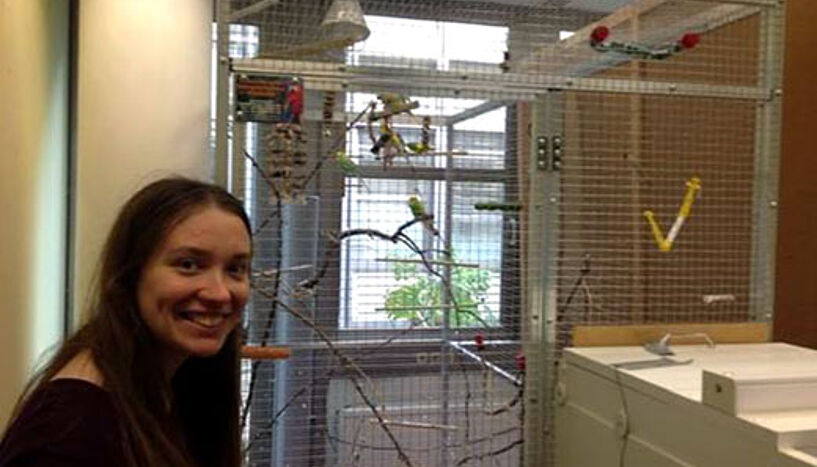Even animals compose
17. Februar 2015Studying other animals can help us answer what it means to be a musical species
Music is found in all human cultures and thus appears to be part of our biology and not simply a cultural phenomenon. One approach to studying the biology of music is to examine other species to see if they share some of the features that make up human musicality. An international research team lead by Marisa Hoeschele from the University of Vienna argue that only by combining examination of species’ natural behaviour and artificially testing species for their potentials the animal foundations for our musical faculty can be discovered. Animal research could be the key to unlocking what features of human music are cultural phenomena, and what features are rooted in our biology. This work is actually published in the scientific journal "Philosophical Transactions of the Royal Society B".
Different human cultural groups developed unique musical systems independently across human history. Despite the uniqueness of each musical system, there are many aspects of music, such as the type of intervals between notes that sound pleasing, that tend to have clear parallels across cultures. It seems very likely, that if all humans develop musical systems, and they also have clear parallels, that music is a biological phenomenon of the human species.
Interestingly, just like there are cross-cultural parallels across musical systems, there are also cross-species parallels of song production and perception. For example, think of the songbirds that are named for having song-like vocalizations. Songbirds also learn how to produce their vocalizations, a prerequisite to learning new songs, which is a relatively uncommon ability in the animal kingdom, and some can learn to produce additional vocalizations over their lifetime. Parrots also have this ability, and have recently also been shown to be able to identify a beat and move to it. Clearly, some animals appear to have biological adaptations that are quite similar to ours.
But do these naturalistic parallels mean that animals can be musical? We already know that at least some animals can categorize music by composer and/or genre much like humans do. The little work that is out there in this quickly-growing field suggests that there are not only many parallels in abilities that are relevant for music, but many animals can perceive the components of music the way we do, and at least some also enjoy similar aspects of sounds that we enjoy. "Our review outlines what we know in the field and where the field needs to go in order to ultimately be able to answer the question of the origins of the human musical capacity", describes Hoeschele.
Publication in Philosophical Transactions of the Royal Society B:
Hoeschele, M., Merchant, H., Kikuchi, Y., Hattori, Y., ten Cate, C. (2015). Searching for the origins of musicality across species. Philosophical Transactions of the Royal Society B, 370(1664).
DOI: 10.1098/rstb.2014.0094
Scientific contact
Marisa Hoeschele, PhD
Department of Cognitive Biology
University of Vienna
1090 Vienna, Althanstraße 14
T +43-699-1722-34 67
marisa.hoeschele(at)univie.ac.at
Press contact
Mag. Veronika Schallhart
Press office, University of Vienna
Research and Teaching
1010 Vienna, Universitätsring 1
T +43-1-4277-175 30
M +43-664-602 77-175 30
veronika.schallhart(at)univie.ac.at
Wissenschaftlicher Kontakt
Marisa Hoeschele, PhD
Department für KognitionsbiologieUniversität Wien
1090 - Wien, Althanstraße 14
+43-699-1722-34 67
marisa.hoeschele@univie.ac.at
Rückfragehinweis
Mag. Veronika Schallhart
DLE ÖffentlichkeitsarbeitUniversität Wien
1010 - Wien, Universitätsring 1
+43-1-4277-17530
+43-664-8176793
veronika.schallhart@univie.ac.at
Downloads:
birds_c_Stefan_flickr.jpg
Dateigröße: 1,41 MB


